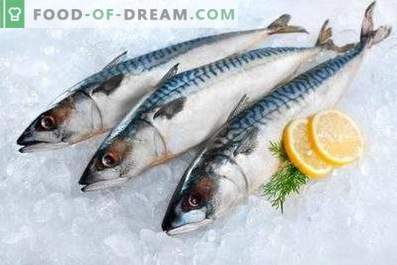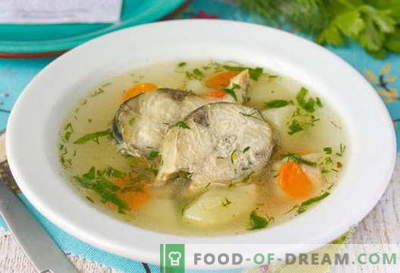
Mackerel, or mackerel, is a thermophilic pelagic fish belonging to the mackerel family. Representatives of this genus inhabit the waters of the Atlantic Ocean, the Baltic, Northern, White, Mediterranean, Marmara, Barents and Black Seas. Mackerel keep along the slopes of the continental shoals at a depth of 150 m and more. As a rule, their flocks consist of individuals of equal size.
Adult mackerel have an elongated spindle-shaped body with a length of 25 to 60 cm and a weight of 500 g to 1, 5 kg, covered with small scales. Thin and flattened caudal stem supplemented by 2 lateral carinae. Dark gray or black curved stripes are clearly visible on the back of a bluish-green color. The sides and abdomen of the fish are yellowish-silver, without marks. Fins (caudal, 2 dorsal, 2 pectoral, ventral, and anal) are brownish-gray or black.
Mackerel has a pointed snout with a large mouth. Palatine and vomer teeth of representatives of this genus are small, conical. The eyes of the mackerel are surrounded by a bone ring and partially covered with fatty centuries. The average life expectancy of fish in natural conditions is 15-18 years.
Mackerel is a valuable target. The meat of this fish is fried, boiled, stewed, baked, salted and marinated. Mackerel fillets prepare cutlets, stuffing for rolls, pies and other pastries.
Nutritional Value
100 g of mackerel contains:
- 18, 107 g of proteins;
- 13, 199 g of fat;
- 67, 693 g of water;
- 1, 294 g of ash;
- 70, 004 mg of cholesterol;
- 2, 467 g of omega-3 fatty acids;
- 0, 517 g of omega-6 fatty acids.
There are 12 essential and 8 essential amino acids in the mackerel.
Vitamins in mackerel
Mackerel is rich in vitamins. 100 g of this fish contains:
- retinol equivalent (A) - 10, 012 μg;
- thiamine (B1) - 0, 119 mg;
- Riboflavin (B2) - 0, 358 mg;
- choline (B4) - 66, 105 mg;
- pantothenic acid (B5) - 0, 847 mg;
- pyridoxine (B6) - 0, 798 mg;
- folic acid (B9) - 8,887 μg;
- cobalamin (B12) - 11, 744 mcg;
- ascorbic acid (C) - 1, 292 mg;
- tocopherol equivalent (E) - 1,577 mg;
- Biotin (H) - 0, 177 μg;
- phylloquinone (K) - 4, 947 mcg;
- nicotinic acid (PP) - 11, 701 mg.
In addition, calciferol (vitamin D) is a part of mackerel. The concentration of this compound in the raw fish fillet is 16.064 μg per 100 g.
Useful items
Macro elements in 100 g of mackerel:
- 279, 802 mg of potassium;
- 41, 013 mg of calcium;
- 49, 557 mg of magnesium;
- 100, 024 mg of sodium;
- 178, 668 mg of sulfur;
- 281, 484 mg of phosphorus;
- 170, 207 mg of chlorine.
Trace elements in 100 g of mackerel:
- 1, 666 mg of iron;
- 44, 794 mcg of iodine;
- 19, 741 µg cobalt;
- 0, 094 mg of manganese;
- 211, 048 μg of copper;
- 3, 909 μg of molybdenum;
- 5, 943 μg of nickel;
- 44, 238 mcg of selenium;
- 1, 448 mg of fluorine;
- 54, 735 mcg of chromium;
- 0, 673 mg of zinc.
Fish calories
In 100 g of raw mackerel contains 190, 212 kcal. In a similar portion of boiled fish meat - 209, 624 kcal, roasted - 277, 114 kcal, salted - 197, 837 kcal, smoked - 243, 049 kcal, pickled - 184, 332 kcal, baked - 192, 079 kcal, stewed - 190 , 424 kcal. The energy value of 100 g of mackerel patties - 257, 084 kcal.
Useful properties of mackerel
- Mackerel is a rich source of easily digestible protein. Therefore, dishes from it are recommended to professional athletes, people engaged in severe mental and physical labor, undergoing serious diseases, recovering from injuries and surgical interventions.
- The nutrients contained in this fish help to normalize hormonal levels during puberty, during menstruation and menopause.
- Fatty acids present in mackerel, improve blood flow in the capillaries, reduce the risk of blood clots, strengthen the vascular walls and give them extra elasticity. In addition, they contribute to the removal of excess low-density lipoprotein from the body, preventing the development of atherosclerosis.
- Useful compounds that enter the digestive tract when eating mackerel dishes, normalize blood pressure.
- The fish contains a whole range of substances with antioxidant properties. It has been proven that they neutralize the negative effect of free radicals on healthy cells, prevent the development of oncological diseases, and slow down the aging processes of tissues.
- Regular consumption of mackerel can significantly improve the condition of the skin, give them elasticity and elasticity, reduce the likelihood of psoriasis and other dermatological diseases.
- Vitamin A and other useful elements contained in fish fillets help improve visual acuity, help protect the visual apparatus from damage under severe loads (for example, during prolonged work at the computer or during prolonged reading).
- It has been proven that eating mackerel dishes can improve brain function, increase learning ability.
- Regular inclusion of mackerel meat in the diet helps reduce the likelihood of developing rheumatoid arthritis, osteoporosis and other diseases of the musculoskeletal system.
- Vitamins of group B, which are rich in mackerel, activate metabolic processes, normalize the nervous system (reduce the negative effects of stress, improve sleep, etc.).
- Dishes from this fish contribute to the excretion of heavy metal salts, radionuclides, toxins and other poisonous compounds from the body.
- Useful substances contained in mackerel, significantly increase the body's resistance to colds, infections and the influence of negative external factors.
- Dishes from this fish help reduce blood glucose.
- Regular consumption of mackerel helps to improve the condition of hair and nails, reduce their fragility and significantly speed up their growth.
Contraindications and harm to mackerel
- Mackerel meat can provoke the development of allergic reactions. Therefore, for individuals who have previously been found to have an individual intolerance to fish and seafood, it is advisable to exclude dishes prepared on its basis from the diet.
- Mackerel is contraindicated for kidney failure and liver disease.
- Smoked or salted mackerel can adversely affect the condition of people suffering from hypertension or diseases of the gastrointestinal tract, occurring in an acute form.
- Mackerel meat can accumulate heavy metals and other harmful substances. Therefore, doctors recommend pregnant women and mothers who are breastfeeding newborns to sharply limit the consumption of this product.
- Mackerel is contraindicated in children under 6 years old.
- Abuse of fried mackerel leads to obesity.























